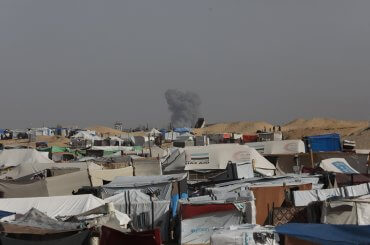Some day, a Haitian writer (maybe Edwidge Danticat?), should do a novel based on the rise and fall of Jean-Bertrand Aristide, the brave priest-turned-president who raised the hopes of Haiti’s poor majority, only to later turn toward authoritarianism, corruption, and violence. Haiti is still poor partly because Aristide failed, and it does no one any good to pretend otherwise.
Aristide took office in 1991 with the greatest hopes in modern Haitian history. Only 9 months later, the military, supported by the Haitian elite, overthrew him, and launched yet another terroristic dictatorship that ended with the U.S. invasion in September 1994. Aristide was only allowed to finish the last year and a half of his elected term.
After his ally, Rene Preval, served from 1996-2000, Aristide was elected again, although with diminishing support, once more toppled in February 2004, and forced into exile.
My friends in Haiti, all of them once Aristide enthusiasts, agree that over time he went bad. They say he armed some of his supporters in Port-au-Prince slums, who functioned as lawless street gangs who extorted from shopkeepers and terrorized entire neighborhoods. Human rights groups, like the National Coalition for Haitian Rights, accused his second government of “illegal and arbitrary arrests, summary executions, disappearances and police brutality.”
Some Haitians even believe he was responsible for the murder of political opponents, like the courageous radio journalist Jean Dominique, killed in 2000, (who is the subject of an affecting Jonathan Demme documentary, The Agronomist). The charitable view among the Haitians I know is that Aristide lost control of his supporters and looked the other way; the more sinister view is that he actually ordered these crimes.
It is absolutely true that Aristide faced tremendous obstacles. The small selfish elite showed it would do anything to stop him, starting with the first coup in 1991. The international financial institutions imposed their unfair version of globalization, whatever the social costs, which included the destruction of Haiti’s domestic rice industry. The George Bush II administration turned over its Haiti policy to its most hateful right-wingers, who almost certainly aided the armed “rebels” – some of them actually human-rights criminals – who overthrew Aristide in 2004.
But Aristide’s one-time supporters, who besides my friends include people like Nancy Roc, a brave journalist, and Chavannes Jean-Baptiste, a leader of the rural poor from the central plateau, insist the obstacles do not justify the violence, authoritarianism, and corruption that came to scar his rule.
The most extreme apologists for Aristide try to deny his human rights violations, despite overwhelming evidence. Others, more reasonable, point to the ferocious opposition, and wonder whether any president could have succeeded. They could well be right, but Aristide should have still governed democratically, and explained to a once sympathetic outside world why Haiti continued to stagnate.
The tragedy is that the Haitian elite had by the time of the earthquake regained all their lost power. Richard Morse, the colorful Haitian-American bandleader who also owns the legendary Oloffson Hotel, has been tweeting from the stricken capital, keeping the world informed. The other day he posted, “Haiti’s elite families are probably lobbying in Washington as I write this; gotta get that gravy train untracked..”
Haiti still needs a genuine revolution. But Aristide’s failure makes it harder.
9 Comments
Most Voted

